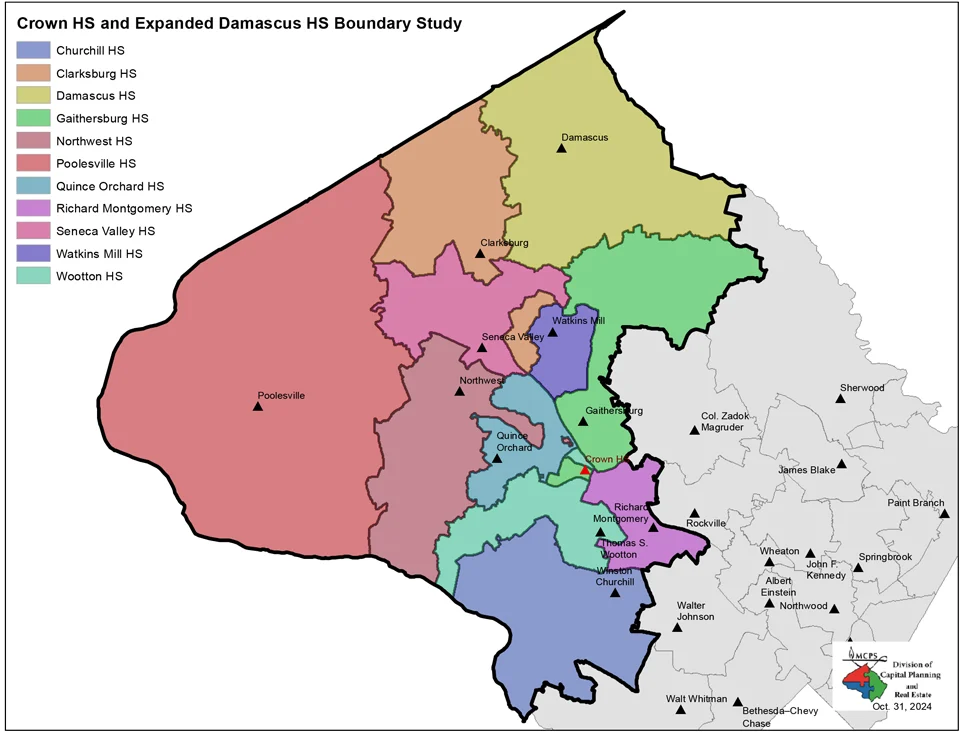Montgomery County (MoCo) has finalized the results of the Nov. 5 general election, with hundreds of thousands of residents participating through early voting, mail-in ballots and in-person voting. The ballot included key presidential races, U.S. Senate and U.S. House of Representatives. Voters also weighed in on a county measure proposing a reduction in the term limit for the county executive and a state constitutional amendment aimed at protecting reproductive rights.
U.S. President
As expected, Kamala Harris secured a decisive victory in Maryland, winning 62% of the vote compared to Donald Trump’s 36%. However, Harris’s margin of victory was narrower than expected, falling about six percentage points short of Joe Biden’s performance in the 2020 general election. Harris received 75% of the vote in Montgomery County, a decline from the 79% Biden gathered in 2020. This shift reflects broader trends nationwide, with a noticeable swing toward Republican candidates.
Danny Hayes, a Political Science professor at George Washington University, said at a Nov. 6 Q&A that this election was a difficult political environment for the Democratic party, mostly due to negative attitudes toward the economy and President Biden’s unpopularity.
“Trump’s victory suggests that the concerns voters have had about the economy, immigration and other issues for the last couple of years of the Biden presidency were really at the forefront of their minds,” Hayes said “Those seemed to be more important than Trump’s liabilities—his felony conviction and legal issues, the January 6th insurrection and the chaos of his first term as President.”
U.S. Senate
Democrat Angela Alsobrooks defeated Republican Larry Hogan by roughly ten percentage points in Maryland’s U.S. Senate race, securing the seat previously held by Democratic Senator Ben Cardin. Alsobrooks’ victory marks a historic milestone as she becomes Maryland’s first Black senator.
Despite the seat’s Democratic lean, Hogan’s popularity as a former governor had given Republicans hope for a potential upset in the competitive race for Senate control. In her campaign, Alsobrooks stressed the importance of maintaining Democratic control of the Senate to garner support from Democrats.
However, Republicans managed to win the Senate without this seat. Some of Alsobrooks’ top priorities are investing more in the education system, addressing the climate crisis and protecting reproductive rights — a key issue for many Maryland voters.
U.S. House of Representatives
Montgomery County spans three Maryland congressional districts for the U.S. House of Representatives, and voters in the county overwhelmingly supported the Democratic candidates across all three districts.
In District 8, which covers the largest portion of Montgomery County, incumbent Democrat Jamie Raskin defeated Republican Cheryl Riley.
In District 4, which covers a smaller part of the county, incumbent Democrat Glenn Ivey easily won against Republican George McDermott. In District 6, which includes only a small fraction of the county, Democrat April Delaney narrowly edged out Republican Neil Parrott in a closely contested race. Despite MoCo’s strong support for Democrats within the county, Republicans maintained control of the House.
Board of Education
In the Montgomery County Board of Education election, voters chose three new members for the at-large seat and Districts 2 and 4. Rita Montoya won the at-large seat with nearly 54% of the vote, defeating incumbent Lynne Harris. In District 2, Natalie Zimmerman secured about 55% of the vote, beating out Brenda Diaz. Laura Stewart triumphed in District 4, earning 58% of the vote against incumbent Shebra Evans. The election results signal a shift in leadership for the county’s school board.
Ballot Measures
Maryland voters overwhelmingly backed a state constitutional amendment to protect reproductive rights, with roughly three-quarters voting in favor. In Montgomery County, support was even higher, with 82% of voters approving the measure. Maryland law already protects reproductive rights, but this amendment enshrines it into the state constitution, making removing these protections more difficult.
On a countywide ballot measure, more than two-thirds of voters approved reducing the county executive’s term limit from three terms to two. As a result, incumbent Democrat Marc Elrich will leave office in two years, losing the opportunity for an additional four-year term.
Elrich has opposed the measure, claiming his opponents pushed it forward after they failed to beat him in past open elections.
“The best strategy, as they knew, was to try to knock me out using term limits,” Elrich said at a Nov. 6 press conference.
While Montgomery County remains a Democratic stronghold in a reliably blue state, both the county and state saw a shift toward Republican support in this election cycle.
















